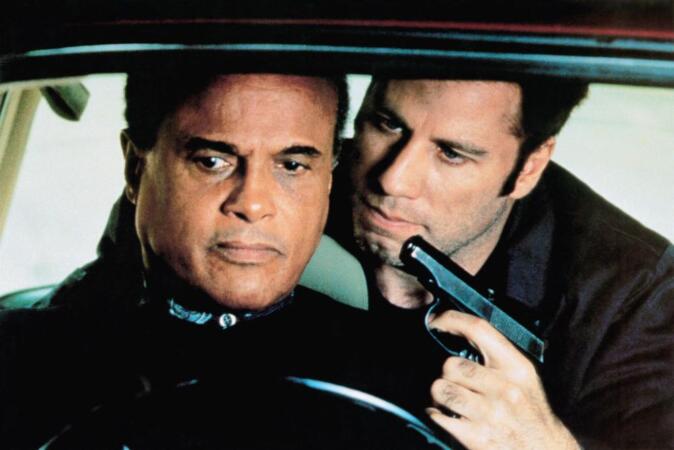
Over the last week, we’ve been celebrating the 90th birthdays of Sidney Poitier (February 20) and Harry Belafonte (March 1), recalling past work (especially lesser known films) and other clickables, both on this blog and on our social media spaces (see pieces on “Porgy & Bess,” “The Slender Thread,” “A Patch of Blue,” “Odds Against Tomorrow,” some Did You Know trivia, a short film about Poitier’s brush with the Hollywood Blacklist, and Belafonte on choosing to act when faced with oppression).
Last year, before the miniseries’ premiere, a handful of black celebrities, including Snoop Dogg, let their feelings known about the “Roots” remake.
Snoop, for example, said via his Instagram account: “They just want to keep showing the abuse that we [African people] took hundreds and hundreds of years ago.”
This started my brain racing about whether I’ve seen any TV/film program where people of the African diaspora were the dominant culture, either in the U.S. or elsewhere. Then it hit me…
“White Man’s Burden” is a 1995 film that attempts to show what that world would look like.
Fresh off his success from “Pulp Fiction” in 1994, John Travolta plays the lead role in the project that was produced by Lawrence Bender, who also produced “Pulp Fiction” (Tarantino urged Travolta to do the movie, so says IMDB’s trivia page).
The basic plot involves Travolta’s character Louis, who’s a low level worker at a chocolate factory who’s asked to deliver a package to the home of the CEO of the factory, named Thaddeus (played by Harry Belafonte), who, during a dinner party that opens the movie, claims that white people (who are the minority and mostly lower class in the film) are inferior and lazy.
Due to a wrong place, wrong time situation, and the handling of it, Louis is fired from this job.
Louis can’t find work and he, his wife (played by Kelly Lynch) , their eleven year old son (played by Andrew Lawrence), and newborn, are evicted from their home and move in with his wife’s mother.
Louis gets desperate and approaches Thaddeus as he’s returning home from work and confronts him about getting fired, eventually abducting him at gun point at the end of the first act.
Throughout the film, we see mostly white citizens walking the streets at night in drunken stupors, while the black upper class dress in African-inspired grab, carrying themselves in a dignified manner, and being philanthropic towards poor white children who just need a helping hand.
But let me go back to the dinner scene at the beginning to the film…
There’s a lot of heat coming off that table. Harry Belafone, Margaret Avery, Sheryl Lee Ralph, Janet Hubert, Bumper Robinson, Tom Wright… Attallah Shabazz! Only thing missing was a deck of cards. Micheal Beach, Wesley Thompson, Willie C. Carpenter, Duane R.Shepard Sr… Even Playboy Playmate Of The Year(1990), Rosie Tenison, gets to play in this alternative universe.
Back to the movie…
After Louis absconds with Thaddeus, the story kind of weaves into “The Defiant Ones” territory as they move from vacant buildings, to being accosted by a group of destitute young white guys, and the starring eventually coming to realize that, “we’re not too different… you and me.”
It’s a feel good moment that sets up a climax that’s logical but still tragic.
The writer/director of this project is Desmond Nakano, a third generation Japanese-American who is noted for co-writing the shooting script for “American Me.”
“White Man’s Burden” was released on December 1, 1995, and earned a box office gross of $3.7 million, with a reported production cost of $7 million, says IMDB. It was also released in eleven other countries.
Roger Ebert opined that, “the movie turns into a routine kidnapping thriller.”
And Peter Travers of Rolling Stone called it a “noble experiment.”
There was also a soundtrack released featuring music from groups like Blues Traveler, Hootie & The Blowfish, Cracker… even Meshell NdegeOcello. But the song I was most familiar with was “We Got It Goin On”, by 1990’s girl R&B duo Changing Faces.
I remember seeing the video at the time (which contains scenes from the movie) and finding it an odd song choice for such a film. But as one of the only black artists on the soundtrack, whose song title describes the world of the movie, it kinda make sense.
Some of my criticisms of the film include that there is no backstory of how African-Americans got into their position of power. Also, was there slavery? Does the one drop rule exist? Is there a white Oprah? Where are the other ethnic groups?
There aren’t any interviews where Bender or Nakano discuss the film that I know of, and I would be interested in a DVD release with commentary/Behind the scenes.
You can watch the film on YouTube for the time being; it’s broken up into parts, but the first part doesn’t have an audio track due to copyright issues.
“White Man’s Burden” probably won’t satisfy most folks hungry to see programming with African-Americans at the height of social and political power, but who would have thought that 13 years later, a guy with a Kenyan father would be dining with his family at the White House.
And if you add Michelle’s family, it might look like the dinner scene in “White Man’s Burden.”
The only person missing is one of Malcolm’s daughters… that’s cause she had to stop and pick up a fresh deck of cards.
‘White Man’s Burden’ trailer:
White Man’s Burden, Dinner Scene”
Changing Faces video, “Got It Goin On”.
White Man’s Burden Film Part 2
